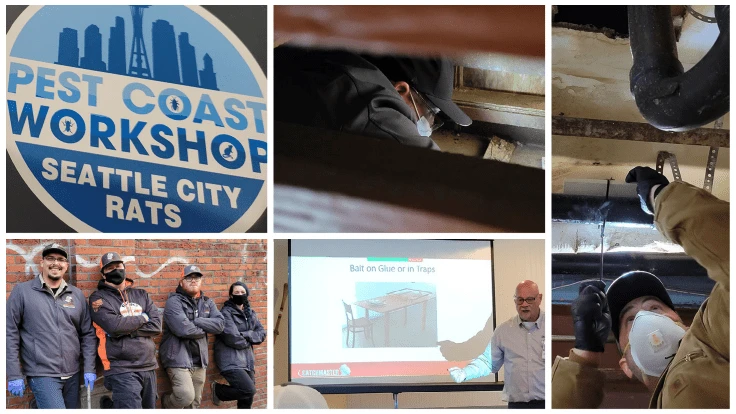
WSPMA
SEATTLE - The first in-person rodent control academy hosted by the Washington State Pest Management Association was a great success, said Billy Olesen, representative of the association and CEO of Washington’s PestStop Pest Control. Olesen played a key part in coordinating the event. He mainly attributed its positive reception to the dedication of vendors and the hands-on nature of the workshop.
The continued success of WSPMA’s in-person Ant ID clinic prompted it to explore similar workshops it could host, Olesen said. After a rodent academy was suggested, vendors like Bell Laboratories, Liphatech, and Bayer stepped up to help actualize the idea. The King County Health Department’s rodent team also played a part in the event.
Around 100 people – 60 in-person and 20 virtually—attended the two-day “Pest Coast Workshop” in mid-November. Both days began in the classroom and ended with groups applying their knowledge in the field. Speakers gave presentations on topics like the dangers of pet rat infestations and how PMPs can best utilize technology while on the job. On day two, some classroom time was also dedicated to discussing observations made when attendees split into groups and performed trapping and exclusion exercises at two places in downtown Seattle.
Pest control companies helped the association connect with the Seattle Union Gospel Mission, a nonprofit ministry that helps the homeless throughout the area. Its building had issues with rodents entering through underground entry points. Food storage and laundry, both of which were maintained in the basement, were being attacked by rats. Olesen said attendees who helped there put a large emphasis on stopping pests from contaminating items the mission collected.
Others worked on combating rodents near Pioneer Square, a part of the city with notorious pest issues. Rodent data was collected at a nearby fire station, Olesen said. In Seattle, it is not uncommon for rats to crawl out of compromised sewers and into people’s yards. Rats crawling out of toilets are also common for a large city like Seattle, he continued.
Those complexities and unique issues and the fact that “things are so concentrated (in Seattle), we just felt like that was going to be a good area to hold this rodent academy,” Olesen said.
Sebum made it easy to detect where rodents were traveling, he continued. Bait stations and traps were deployed on the first day, and land was surveyed to see what exclusion work could be done. The next day, attendees discussed the data gathered.
Once back in the classroom, attendees spoke about the previous day’s work and offered up different perspectives on observations and data findings. The diversity of thought was a highlight of the event, Olesen said. Communication between company representatives that do not usually work together helped everyone gain a better understanding of each other’s perspectives. There was a ton of screening and trapping performed thanks to the many people on hand, Olesen said.
Even Olesen, who has worked in pest control for nearly 20 years, said he learned something. One of the most valuable resources the workshop connected him with was a special medical wallet card. The card can be used to inform medical personnel that PMPs like him may have been exposed to zoonotic diseases because of their jobs. A printable version of the card can be found on the Cornell Wildlife Health Lab website.
WSPMA also continues to coordinate efforts to ensure that pest control is still being maintained effectively at locations it helped serve. The success of the first Pest Coast Workshop has also prompted the association to explore hosting more in-person and hands-on classes, some even on the road. The association is already in talks about hosting another rodent academy next year, Olesen said. Keep an eye on its website, www.wspma.com, for upcoming event information.
The workshop raised around $6,000 for WSPMA and did a great job bringing people together, Olesen said. The staff of the Seattle Union Gospel Mission were also greatly appreciative of pest mitigation efforts. He said their thanks was a reward of its own.
Rodent academies were something WSPMA wanted to bring to Washington, he added. The Pest Coast Workshop was one of the best-attended events by company representatives. That likely speaks to the hands-on nature of the workshop and the fact that it was one of the very first in-person seminars of its kind in the state, Olesen said.
Latest from Pest Control Technology
- Donny Oswalt Shares What Makes Termites a 'Tricky' Pest
- Study Finds Fecal Tests Can Reveal Active Termite Infestations
- Peachtree Pest Control Partners with Local Nonprofits to Fight Food Insecurity
- Allergy Technologies, PHA Expand ATAHC Complete Program to Protect 8,500 Homes
- Housecall Pro Hosts '25 Winter Summit Featuring Mike Rowe
- Advanced Education
- Spotted Lanternflies, BMSBs Most Problematic Invasive Pests, Poll Finds
- Ecolab Acquires Guardian Pest Solutions





